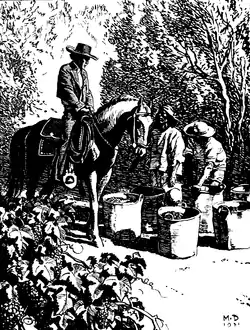Hugo Reid
Hugo Reid (April 18, 1811 – December 12, 1852), born in Scotland, was an early resident of Los Angeles County who became a naturalized citizen of California (then a part of Mexico) and who married a local Gabrieleño woman.[1] Reid wrote a series of newspaper articles, or "letters," that described the culture, language, and contemporary circumstances of the local Tongva (Gabrieleño) people, criticizing their treatment by Franciscan missionaries who administered the Spanish missions in California.[2]

Life
Born to Charles Reid and Essex Milliken, at Cardross, Dunbartonshire, Scotland, on 18 April 1811,[3] Reid established a trading house in Hermosillo, Mexico in the late-1820s with a business partner, William Keith, and first visited Los Angeles, then a part of Mexican Alta California, in 1832.[4] He married a Gabrieleño woman (a Mission San Gabriel convert renamed Victoria Bartolomea Comicrabit)[5] and adopted her children, María and Felipe.
_Baldwin%252C_the_former_Hugo_Reid_Adobe%252C_at_Rancho_Santa_Anita%252C_ca.1903_(CHS-5178).jpg.webp)
Reid and his wife were granted the 13,319-acre (53.90 km2) Rancho Santa Anita following secularization of the Mission San Gabriel ranch lands, and built an adobe house there in 1839.[1] The grant was confirmed by Alta California Governor Pio Pico in 1845. A restored adobe, known as the "Hugo Reid Adobe", was in fact built on a different nearby site by a later owner.[6] Both Reid's original site and the current adobe are located at the Los Angeles County Arboretum and Botanic Garden, part of the former estate of Lucky Baldwin, in what is now the town of Arcadia. Reid was nicknamed the Scotch Paisano during his days as a Scottish settler in Mexican Southern California.[5]
Reid wrote a series of 22 letters which were published in the Los Angeles Star in 1852, and which provide an important ethnographic picture of the little–known Gabrieleño people. They were republished in book form several times.[2] The first publication in book form was by Arthur M. Ellis in 1926, in an edition of only 200 copies,[7] so in 1939 they were again reprinted by Susanna Bryant Dakin.[5]
Reid died in Los Angeles on December 12, 1852.[8] His funeral was held at the old Our Lady Queen of Angels Church, located on Main Street in Los Angeles, and he was buried in the adjacent cemetery. His body was later moved to the Campo Santo (cemetery) on North Broadway (now the site of Cathedral High School). His remains were then disinterred and moved to the new Calvary Cemetery in East Los Angeles.[9]
See also
References
- "Historic Structures: Hugo Reid Adobe". Los Angeles County Arboretum and Botanic Garden. Los Angeles County Arboretum and Botanic Garden. Archived from the original on 9 February 2014. Retrieved 20 October 2013.
- Reid, Hugo (1968). "The Indians of Los Angeles County: Hugo Reid's letters of 1852". Library of Congress. Braun Research Library, Southwest Museum, Los Angeles, California. Retrieved August 25, 2018.
- Scotland, Births and Baptisms, 1564-1950, index, FamilySearch (https://familysearch.org/pal:/MM9.1.1/XYZG-LPJ;: accessed 12 December 2012), Hugo Reid, 1811; citing Scotland Registrar General, Registers of births, marriages and deaths, FHL microfilm 0102138, 1041983, The New Register House, Edinburg, Scotland.
- Casas, Maria Raquel (2005). "Victoria Reid and the Politics of Identity". In Ruiz, Vicki L.; Sanchez-Korrol, Virginia (eds.). Latina Legacies : Identity, Biography, and Community: Identity, Biography and Community. New York, New York: Oxford University Press. ISBN 0-19-515398-7.
- Dakin, Susanna Bryant (1939). A Scotch Paisano in Old Los Angeles: Hugo Reid's Life in California, 1832-1852, Derived from his Correspondence. Berkeley, California: University of California Press.
- Peters, Bill (2009). "Arboretum's Shocking Revelation: It isn't the Hugo Reid Adobe!". Arcadia Weekly. Retrieved June 5, 2016.
- Ellis, Arthur M. (1926). Hugo Reid's Account of the Indians of Los Angeles County. Los Angeles, California: Privately Printed.
- King, Laura Everston (1898). "Hugo Reid and His Indian Wife". Annual Publication of the Historical Society of Southern California and Pioneer Register. 4 (2): 111–113.
- Kielbasa, John R. (1997). Historic Adobes of Los Angeles County. Pittsburgh, PA: Dorrance Publishing.
Sources
- Dakin, Susanna Bryant. 1939. A Scotch Paisano: Hugo Reid's Life in California, 1832-1852, Derived from His Correspondence. University of California Press, Berkeley.
- Ellis, Arthur M. 1926. Hugo Reid's Account of the Indians of Los Angeles County. Privately Printed, Los Angeles.
- Reid, Hugo. 1968. The Indians of Los Angeles County: Hugo Reid's Letters of 1852. Edited and annotated by Robert F. Heizer. Southwest Museum Papers No. 21. Los Angeles.
